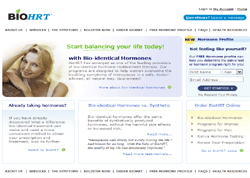IS IT HOT IN HERE, OR IS IT JUST ME?
BioHRT Medical News
Roughly 85 percent of all menopausal women experience "hot flashes." Hot flashes can begin when the menstrual cycle is either still regular or has just started to become irregular, and they usually stop one to two years after the final menstrual period.
A hot flash can feel different for each woman. Some women experience a feeling of warmth in their faces and upper bodies, while others experience sweating and chills. Some women feel anxious, tense, dizzy, or nauseous just before the hot flash, and others feel tingling in their fingers or heart palpitations just before. Hot flashes can be experienced during the day, as well as in the evening, with many women experiencing such severe hot flashes that they need to change their bedsheets or nightclothes. This may be followed by a chill that has one gropping for the covers that were kicked to the floor just minutes earlier. It is usually over in seconds, and there is no telling when it will reoccur – maybe minutes, maybe hours – but it will be back.
What causes hot flashes, sweats and heat intolerance?
These symptoms occur as a response to changing hormone levels which induce confusion (doctors refer to this as "vasomotor instability") in the temperature regulating mechanism of the body. Your body "thermostat", located in an area of the brain called the hypothalamus", is intermittently fooled into believing that your body temperature should be lower. Normally, when the body is too warm, the hypothalamus sends a chemical message to the heart to cool off the body by pumping more blood, causing the blood vessels under the skin to dilate, which makes you perspire. The "sweats" some women experience is a more extreme cooling measure. Evaporation of liquid in the form of perspiration from the skin is utilized to reduce body temperature. If you recall how chilled you feel when you get out of a swimming pool or a bath, you can see how effective evaporation is as a cooling mechanism. During menopause, however, it's believed that the hypothalamus gets confused and sends this "cooling off" signal at the wrong times. A hot flash is not the same as being overheated. Although the skin temperature often rises between 4 to 8 degrees Farenheit, the internal body temperature drops, creating this odd sensation.
Why does the hypothalamus get so confused?
The answer is an imbalance of estrogen. When estrogen is given to replace lost estrogen in the body, hot flashes disappear. Triggered by excessive estrogen in perimenopause or falling estrogen in menopause, hot flashes arrive unannounced, and usually at a most inconvenient time; in the middle of a job interview, in the middle of an important speech or in the middle of the night, for example. Although hot flashes are harmless in terms of health risks, they are disquieting and stressful.
Women in the following categories generally experience a greater severity of hot flash symptoms:
- Women in surgical menopause . This includes: Cancer therapy, Hysterectomy, Bilateral Oophorectomy (the removal of both ovaries before natural menopause), etc.
- Women who are thin . When there's less fat on the body to store estrogen reserves, estrogen loss symptoms are more severe.
- Women who don't sweat easily. An ability to sweat makes extreme temperatures easier to tolerate. Women who have trouble sweating may experience more severe flashes.
- Women experiencing extreme stress
- Women making poor nutritional choices
What is the treatment for Hot Flashes, Sweats and Heat Intolerance?
Bio Identical Hormone Replacement Therapy, using estrogen and, if needed, testosterone, is the most effective treatment. BioHRT provides saliva testing to identify to what degree the specific hormones linked are out of balance. Using the test results as a guideline, a natural hormone replacement will be formulated to restore balance and ‘cool' the hot flashes.
Following is a list of guidelines that may help to lessen the severity of your symptoms, in addition to the BioHRT natural hormone replacement therapy.
- Avoid synthetic clothing, such as polyester, it traps perspiration.
- If you have night sweats, use only 100 percent cotton bedding.
- Avoid clothing with high necks and long sleeves.
- Dress in layers.
- Keep cold drinks handy.
- If you smoke, cut down or quit. Smoking constricts blood vessels and can intensify and prolong a flash.
- Avoid "trigger" foods such as caffeine, alcohol, spicy food, and sugar.
- Avoid eating large meals.
- Substitute herbal teas for coffee or regular tea.
- Consider a Vitamin E supplement. Evidence suggests that Vitamin E is essential for proper circulation, as well as production of sex hormones.
- Exercise. This will improve your circulation.
- Reduce your exposure to the sun. A sunburn will only aggravate your hot flashes. This is because burnt skin cannot regulate heat as effectively.
The more comfortable you are, the less intense your flashes will feel.
View BioHRT's Bio-identical Hormone Treatment Programs

